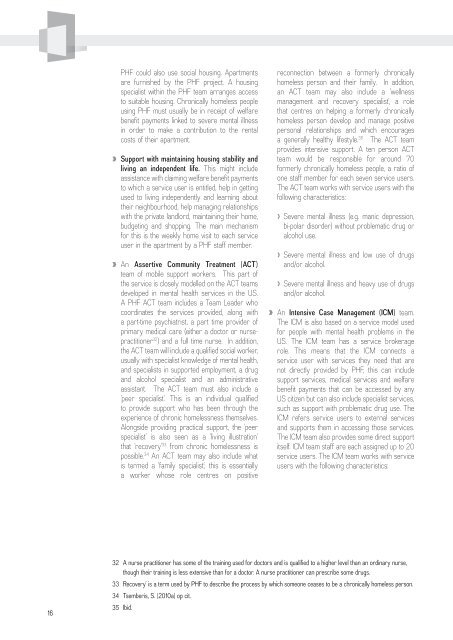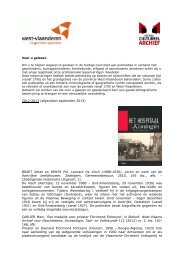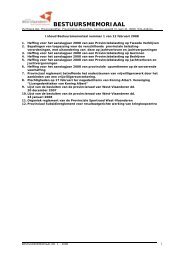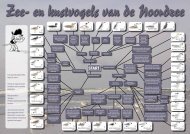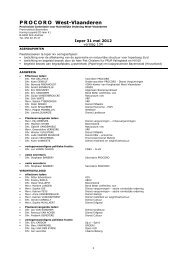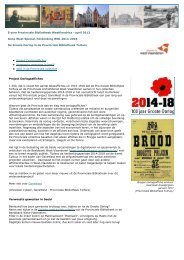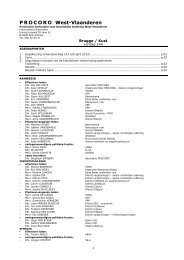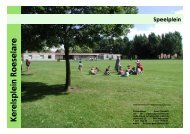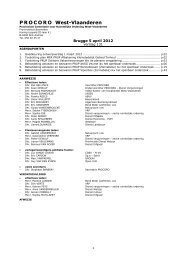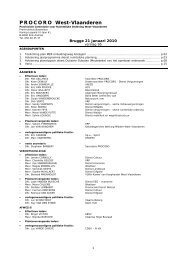Housing First - Provincie West-Vlaanderen
Housing First - Provincie West-Vlaanderen
Housing First - Provincie West-Vlaanderen
You also want an ePaper? Increase the reach of your titles
YUMPU automatically turns print PDFs into web optimized ePapers that Google loves.
PHF could also use social housing. Apartmentsare furnished by the PHF project. A housingspecialist within the PHF team arranges accessto suitable housing. Chronically homeless peopleusing PHF must usually be in receipt of welfarebenefit payments linked to severe mental illnessin order to make a contribution to the rentalcosts of their apartment.❱❱Support with maintaining housing stability andliving an independent life. This might includeassistance with claiming welfare benefit paymentsto which a service user is entitled, help in gettingused to living independently and learning abouttheir neighbourhood, help managing relationshipswith the private landlord, maintaining their home,budgeting and shopping. The main mechanismfor this is the weekly home visit to each serviceuser in the apartment by a PHF staff member.❱❱An Assertive Community Treatment (ACT)team of mobile support workers. This part ofthe service is closely modelled on the ACT teamsdeveloped in mental health services in the US.A PHF ACT team includes a Team Leader whocoordinates the services provided, along witha part-time psychiatrist, a part time provider ofprimary medical care (either a doctor or nursepractitioner32 ) and a full time nurse. In addition,the ACT team will include a qualified social worker,usually with specialist knowledge of mental health,and specialists in supported employment, a drugand alcohol specialist and an administrativeassistant. The ACT team must also include a‘peer specialist’. This is an individual qualifiedto provide support who has been through theexperience of chronic homelessness themselves.Alongside providing practical support, the ‘peerspecialist’ is also seen as a ‘living illustration’that ‘recovery’ 33 from chronic homelessness ispossible. 34 An ACT team may also include whatis termed a ‘family specialist’; this is essentiallya worker whose role centres on positivereconnection between a formerly chronicallyhomeless person and their family. In addition,an ACT team may also include a ‘wellnessmanagement and recovery specialist’, a rolethat centres on helping a formerly chronicallyhomeless person develop and manage positivepersonal relationships and which encouragesa generally healthy lifestyle. 35 The ACT teamprovides intensive support. A ten person ACTteam would be responsible for around 70formerly chronically homeless people, a ratio ofone staff member for each seven service users.The ACT team works with service users with thefollowing characteristics:〉〉Severe mental illness (e.g. manic depression,bi-polar disorder) without problematic drug oralcohol use.〉〉Severe mental illness and low use of drugsand/or alcohol.〉〉Severe mental illness and heavy use of drugsand/or alcohol.❱❱An Intensive Case Management (ICM) team.The ICM is also based on a service model usedfor people with mental health problems in theUS. The ICM team has a service brokeragerole. This means that the ICM connects aservice user with services they need that arenot directly provided by PHF, this can includesupport services, medical services and welfarebenefit payments that can be accessed by anyUS citizen but can also include specialist services,such as support with problematic drug use. TheICM refers service users to external servicesand supports them in accessing those services.The ICM team also provides some direct supportitself. ICM team staff are each assigned up to 20service users. The ICM team works with serviceusers with the following characteristics:1632 A nurse practitioner has some of the training used for doctors and is qualified to a higher level than an ordinary nurse,though their training is less extensive than for a doctor. A nurse practitioner can prescribe some drugs.33 Recovery’ is a term used by PHF to describe the process by which someone ceases to be a chronically homeless person.34 Tsemberis, S. (2010a) op cit.35 Ibid.


